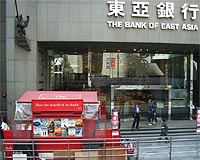| . |  |
. |
Brussels (AFP) Oct 6, 2010 China and the European Union wound up a tug-of-war summit Wednesday failing to bridge wide rifts on a gamut of issues ranging from trade to human rights. "As in any true partnership, the EU and China have commonalities but also differences of approach," said EU president Herman Van Rompuy in a short statement released as the divisive one-day get-together wrapped up. "This should not impede our joint will to bring the relationship to a higher level. We should be ambitious and make sincere efforts to achieve progress," he added. There was no separate statement on the fractious summit from Chinese Premier Wen Jiabao as he flew off to Rome for a visit. But a media conference that could have offered further explanation on the rifts was cancelled, officially for scheduling reasons. "We realised during the talks there may have been little to say," a diplomat said. At stake for the EU, which this week also hosted a Europe-Asia meeting gathering 46 nations, or almost 60 percent of the world population, has been a bid to nudge the emerging superpower to bend to global rules. "With great power comes great responsibilities," said European Commission president Jean-Manuel Barroso. Van Rompuy and Barroso said there had been "an open discussion" on the issue of human rights, dear to the EU's heart but contentious for Beijing. "We called for progress in this area, notably in the ratification of the International Covenant on Civil and Political Rights," they said in joint remarks. The question of human rights, he added, "for us remains an important element of the dialogue with China." But a joint declaration issued with China at the wind-up made no mention of rights. In a rare show of divergence for a diplomatic encounter of this type, the summit had opened with both Van Rompuy and Wen openly and publicly stating "differences" between the two sides. "It is true that between China and the EU there are still a number of major issues that have remained unresolved for a long time," said Wen. "That is not in keeping with the fundamental interests of both sides," he added. Van Rompuy had said the "differences" must not impede but "on the contrary, they should stimulate our discussion." The final statement however failed to list areas of accord, instead running through the sticking points -- currency, trade and representation for emerging nations in global institutions. An EU source told AFP that a bid to force China to revalue its currency, which the West says is helping flood the world with cheap Chinese exports, fell on deaf ears at a time when the euro has hit an eight-month high. "We put our cards on the table," the source said. "We heard each other out and managed to establish a dialogue of sorts in the economic sphere. "But it was not an easy summit." Earlier, Wen had told a Europe-China business forum: "I say to Europe's leaders -- don't join the chorus pressing (China) to revalue the yuan." A sharp yuan appreciation would "cause many Chinese companies to go bankrupt, casting people out of work... and creating social unrest," Wen insisted. Van Rompuy and Barroso expressed to Wen "the need for a level playing field in China for our businesses," including the "opening up of public procurement." Europe has threatened to make it tougher for Chinese companies to bag major contracts if it does not ease barriers. While China appeared immovable on these issues, the pair indicated that, two days from the start of talks at the International Monetary Fund to agree a new board, Europe was not ready to give further ground on voting rights in the Washington-based lender of last resort. "We underlined that enhanced representation should go hand in hand with enhanced responsibilities in global governance," the EU leaders said pointedly. The EU-China meeting followed an EU-South Korea summit earlier Wednesday marked by the signing of a historic free trade pact, the first in a possible slew that Europe hopes to seal with Asia.
Share This Article With Planet Earth
Related Links Global Trade News
 Asian growth needs stronger currencies: IMF
Asian growth needs stronger currencies: IMFWashington (AFP) Oct 6, 2010 China needs a stronger currency to boost domestic demand and reduce its reliance on exports, a rebalancing needed across Asia to ensure the region's long-term growth prospects, the IMF said Wednesday. In its latest world economic outlook, the International Monetary Fund said that for China, it was "critical to enhance the role of household consumption in domestic growth" to drive the economy ... read more |
|
| The content herein, unless otherwise known to be public domain, are Copyright 1995-2010 - SpaceDaily. AFP and UPI Wire Stories are copyright Agence France-Presse and United Press International. ESA Portal Reports are copyright European Space Agency. All NASA sourced material is public domain. Additional copyrights may apply in whole or part to other bona fide parties. Advertising does not imply endorsement,agreement or approval of any opinions, statements or information provided by SpaceDaily on any Web page published or hosted by SpaceDaily. Privacy Statement |